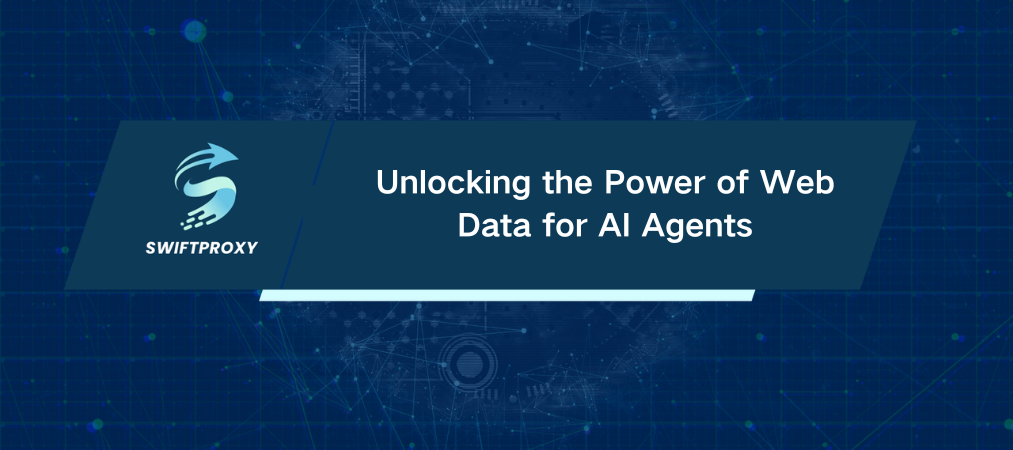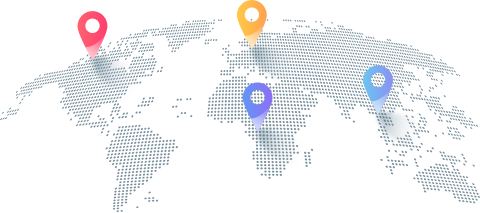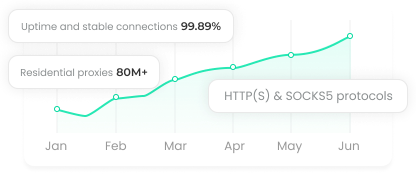Unlocking the Power of Web Data for AI Agents

AI depends entirely on data, and without it, AI would be little more than guesswork. The rapid rise of AI, particularly large language models such as GPT and Llama, is fueled by vast amounts of web data. These models are not created out of thin air—they are trained using billions of web pages collected from across the internet.
However, these models don't know everything. Far from it. Their knowledge is a frozen snapshot, often outdated and sometimes plain wrong. To unlock real-world value, they need to connect with fresh, live data—and that's where AI agents come in. And guess where they pull that data from? Yep, the web.
AI Agents Can't Work Alone
People often assume AI “knows it all.” Spoiler alert: it doesn't. Models like GPT-4 freeze their training knowledge around early 2023. Anything newer? They're clueless unless updated manually. And even within their training window, their knowledge is fuzzy at best.
Why? Because AI models compress massive datasets into patterns and probabilities—they guess based on those patterns. That means hallucinations, outdated facts, or misquotes are baked in. So, how do we get reliable, up-to-date answers?
AI agents. These smart systems actively hunt for fresh information online in real time. They pull data, analyze it, and plug it into the model's reasoning. This turns guesswork into precision.
But there is one prerequisite which is access to the living web.
The Web Fuels Modern AI Innovation
Years before AI agents became buzzwords, companies like Apify were already perfecting web scraping tools to pull real-time data from thousands of sites. Today, that expertise is gold.
Take agents like Deep Research or Manus. They can scan entire public web domains, digest vast amounts of info, and deliver actionable insights—in minutes. What once took teams days or weeks now takes a single script to run.
Imagine tracking competitor pricing across dozens of marketplaces or spotting emerging trends without lifting a finger. Agents browse, extract, and summarize—all automatically. However, none of that works without data access.
The Challenge of Websites Not Loving Bots
Most websites guard their content fiercely. They deploy rate limits, bot detection, and CAPTCHAs to block automated crawlers. Makes sense—they need to protect their servers and user experience.
But AI agents need to see the page to deliver value. Without that access, no Google search results, no AI-powered summaries, no intelligent assistants.
Enter proxies. These act like chameleons, routing agent traffic through multiple IPs to mimic human browsing patterns. This helps agents dodge blocks and stay under the radar.
Proxies also solve a sneaky problem: location-based content. Prices, product availability, search results—they all vary by geography. Proxies let agents appear local, giving them the exact data they need.
Doing It Right with Ethics and Sustainability
Just because you can scrape doesn't mean you should scrape recklessly. Responsible web scraping is non-negotiable—for legal, ethical, and practical reasons.
Here's how to keep it clean:
Throttle your requests. Don't hammer websites with floods of traffic.
Respect robots.txt. It's a website's polite “no trespassing” sign.
Avoid personal or sensitive info. That's a legal minefield.
Honor “no scraping” notices. If a site says no, respect it.
The goal? To build a sustainable relationship with the web. Scraping should coexist with websites, not break them. When done right, it benefits everyone.
The Rapid Growth of Web Data Demand
We're still in the infancy of AI agents. Today's tools mostly wrap language models with some clever prompts. But tomorrow's agents will plan, execute, and adapt autonomously—deciding when to seek new info or ask for help.
And for that, static knowledge just won't cut it. They need live input—real-time data from the web. Market trends, product reviews, pricing shifts, policy updates, scientific papers, social signals. The web is the richest, freshest source of this information.
Businesses that invest now—building or partnering with reliable, ethical web data infrastructure—will outpace competitors in the fast-approaching “agent economy.”
Final Thoughts
AI agents without access to web data are like cars without fuel—stuck and limited. When connected to live web data, they become powerful problem solvers that adapt in real time and deliver meaningful results.
Building such AI requires more than just expertise. It demands robust infrastructure like proxies, intelligent scrapers, and reliable data pipelines, combined with a strong commitment to ethical and sustainable practices. The web isn't just a data source; it's the lifeblood driving the next big leap in AI.
Note sur l'auteur

AI depends entirely on data, and without it, AI would be little more than guesswork. The rapid rise of AI, particularly large language models such as GPT and Llama, is fueled by vast amounts of web data. These models are not created out of thin air—they are trained using billions of web pages collected from across the internet.
However, these models don't know everything. Far from it. Their knowledge is a frozen snapshot, often outdated and sometimes plain wrong. To unlock real-world value, they need to connect with fresh, live data—and that's where AI agents come in. And guess where they pull that data from? Yep, the web.
AI Agents Can't Work Alone
People often assume AI “knows it all.” Spoiler alert: it doesn't. Models like GPT-4 freeze their training knowledge around early 2023. Anything newer? They're clueless unless updated manually. And even within their training window, their knowledge is fuzzy at best.
Why? Because AI models compress massive datasets into patterns and probabilities—they guess based on those patterns. That means hallucinations, outdated facts, or misquotes are baked in. So, how do we get reliable, up-to-date answers?
AI agents. These smart systems actively hunt for fresh information online in real time. They pull data, analyze it, and plug it into the model's reasoning. This turns guesswork into precision.
But there is one prerequisite which is access to the living web.
The Web Fuels Modern AI Innovation
Years before AI agents became buzzwords, companies like Apify were already perfecting web scraping tools to pull real-time data from thousands of sites. Today, that expertise is gold.
Take agents like Deep Research or Manus. They can scan entire public web domains, digest vast amounts of info, and deliver actionable insights—in minutes. What once took teams days or weeks now takes a single script to run.
Imagine tracking competitor pricing across dozens of marketplaces or spotting emerging trends without lifting a finger. Agents browse, extract, and summarize—all automatically. However, none of that works without data access.
The Challenge of Websites Not Loving Bots
Most websites guard their content fiercely. They deploy rate limits, bot detection, and CAPTCHAs to block automated crawlers. Makes sense—they need to protect their servers and user experience.
But AI agents need to see the page to deliver value. Without that access, no Google search results, no AI-powered summaries, no intelligent assistants.
Enter proxies. These act like chameleons, routing agent traffic through multiple IPs to mimic human browsing patterns. This helps agents dodge blocks and stay under the radar.
Proxies also solve a sneaky problem: location-based content. Prices, product availability, search results—they all vary by geography. Proxies let agents appear local, giving them the exact data they need.
Doing It Right with Ethics and Sustainability
Just because you can scrape doesn't mean you should scrape recklessly. Responsible web scraping is non-negotiable—for legal, ethical, and practical reasons.
Here's how to keep it clean:
Throttle your requests. Don't hammer websites with floods of traffic.
Respect robots.txt. It's a website's polite “no trespassing” sign.
Avoid personal or sensitive info. That's a legal minefield.
Honor “no scraping” notices. If a site says no, respect it.
The goal? To build a sustainable relationship with the web. Scraping should coexist with websites, not break them. When done right, it benefits everyone.
The Rapid Growth of Web Data Demand
We're still in the infancy of AI agents. Today's tools mostly wrap language models with some clever prompts. But tomorrow's agents will plan, execute, and adapt autonomously—deciding when to seek new info or ask for help.
And for that, static knowledge just won't cut it. They need live input—real-time data from the web. Market trends, product reviews, pricing shifts, policy updates, scientific papers, social signals. The web is the richest, freshest source of this information.
Businesses that invest now—building or partnering with reliable, ethical web data infrastructure—will outpace competitors in the fast-approaching “agent economy.”
Final Thoughts
AI agents without access to web data are like cars without fuel—stuck and limited. When connected to live web data, they become powerful problem solvers that adapt in real time and deliver meaningful results.
Building such AI requires more than just expertise. It demands robust infrastructure like proxies, intelligent scrapers, and reliable data pipelines, combined with a strong commitment to ethical and sustainable practices. The web isn't just a data source; it's the lifeblood driving the next big leap in AI.


















































